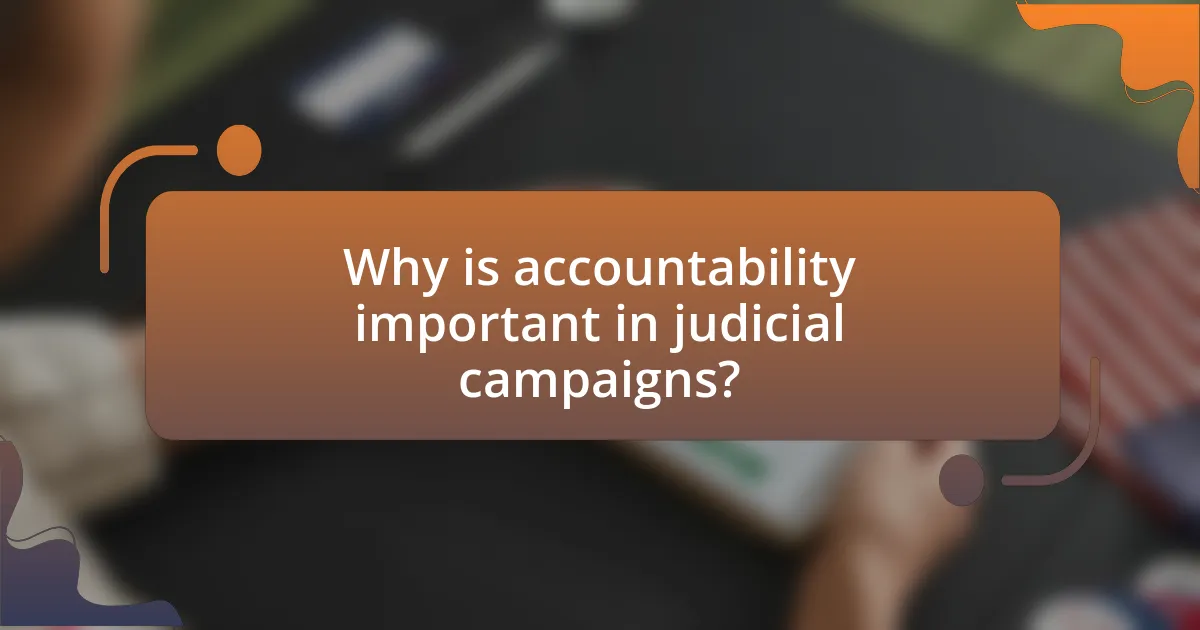The article focuses on the evolving trends in accountability practices within judicial campaigns. It highlights the increasing influence of outside funding, the demand for candidate transparency, and the role of digital platforms in voter engagement. Key discussions include the impact of public perception on accountability, variations in practices across jurisdictions, and the significance of technological advancements. The article also examines the importance of accountability in maintaining public trust, the consequences of its absence, and the role of various stakeholders in shaping these practices. Emerging trends and best practices for enhancing accountability in future judicial campaigns are also addressed.

What are the current trends in judicial campaigns?
Current trends in judicial campaigns include increased funding from outside sources, heightened focus on candidate transparency, and the use of digital platforms for outreach. Recent data shows that judicial races are experiencing a surge in spending, with outside groups contributing significantly to campaign financing, which can influence judicial independence. Additionally, candidates are prioritizing transparency by disclosing campaign contributions and financial interests to build public trust. The rise of social media and online advertising has transformed how candidates engage with voters, allowing for targeted messaging and broader reach. These trends reflect a shift towards greater accountability and responsiveness in judicial campaigns.
How are accountability practices evolving in judicial campaigns?
Accountability practices in judicial campaigns are evolving through increased transparency, enhanced voter engagement, and the integration of technology. Judicial candidates are now more frequently required to disclose campaign financing sources, which allows voters to better understand potential conflicts of interest. For instance, states like California have implemented stricter campaign finance laws that mandate detailed reporting of contributions, thereby fostering accountability. Additionally, the use of social media platforms has enabled candidates to engage directly with voters, allowing for real-time feedback and accountability regarding their positions and actions. Research from the Brennan Center for Justice indicates that these trends are leading to a more informed electorate, which is crucial for maintaining the integrity of the judicial system.
What role does public perception play in these evolving practices?
Public perception significantly influences evolving practices in judicial campaigns by shaping the expectations and accountability standards for candidates. As voters become more informed and engaged, their perceptions drive candidates to adopt transparency measures and ethical practices to gain public trust. For instance, a 2021 survey by the Brennan Center for Justice found that 70% of respondents believe that judicial candidates should disclose their campaign contributions, indicating that public demand for accountability is rising. This shift in public perception compels candidates to align their practices with the values and expectations of the electorate, ultimately impacting the integrity and effectiveness of judicial campaigns.
How do accountability practices differ across various jurisdictions?
Accountability practices differ significantly across various jurisdictions due to variations in legal frameworks, cultural norms, and institutional structures. For instance, in the United States, accountability mechanisms for judges often include electoral processes, where judges are subject to public votes, while in countries like Canada, judges are appointed and held accountable through judicial review and oversight bodies. Additionally, jurisdictions such as the European Union emphasize accountability through adherence to human rights standards and transparency requirements, which are enforced by supranational institutions. These differences illustrate how local governance, political culture, and historical context shape the methods and effectiveness of judicial accountability.
What impact do technological advancements have on judicial campaigns?
Technological advancements significantly enhance judicial campaigns by improving outreach, engagement, and transparency. Digital platforms enable candidates to communicate directly with voters, facilitating targeted messaging and real-time interaction. For instance, social media allows judicial candidates to share their platforms and respond to public concerns instantly, increasing voter awareness and participation. Additionally, data analytics tools help campaigns identify key demographics and tailor their strategies accordingly, leading to more effective fundraising and voter mobilization efforts. According to a study by the Brennan Center for Justice, the use of online fundraising tools has increased campaign contributions by over 30% in recent election cycles, demonstrating the tangible impact of technology on judicial campaign financing.
How are social media platforms influencing voter engagement in judicial elections?
Social media platforms are significantly influencing voter engagement in judicial elections by providing accessible channels for information dissemination and interaction. These platforms enable candidates to communicate directly with voters, share campaign messages, and mobilize support through targeted advertising and grassroots organizing. For instance, a study by the Pew Research Center found that 69% of adults in the U.S. use social media, which allows judicial candidates to reach a broader audience and engage younger voters who may be less likely to participate in traditional campaign methods. Additionally, social media facilitates real-time discussions and feedback, fostering a more interactive political environment that can enhance voter awareness and participation in judicial elections.
What tools are being used to enhance transparency in judicial campaigns?
Tools used to enhance transparency in judicial campaigns include campaign finance disclosure systems, online databases for tracking contributions, and public reporting requirements. Campaign finance disclosure systems require candidates to report their funding sources, which allows voters to see who is financially supporting judicial candidates. Online databases, such as the National Institute on Money in Politics, aggregate and provide access to campaign finance data, making it easier for the public to analyze contributions. Public reporting requirements mandate that candidates disclose their campaign expenditures and contributions, fostering accountability and informed voting. These tools collectively aim to reduce corruption and increase public trust in the judicial election process.

Why is accountability important in judicial campaigns?
Accountability is crucial in judicial campaigns because it ensures that candidates are transparent and responsible for their actions and decisions. This transparency fosters public trust in the judicial system, as voters can evaluate candidates based on their qualifications, ethical standards, and past performance. Research indicates that accountability mechanisms, such as public disclosures and performance evaluations, enhance the integrity of the judicial process and deter misconduct. For instance, a study by the Brennan Center for Justice highlights that states with robust accountability practices report higher levels of public confidence in their courts.
What are the consequences of a lack of accountability in judicial elections?
A lack of accountability in judicial elections leads to diminished public trust in the legal system. When judges are not held accountable for their actions or decisions, it can result in biased rulings, favoritism, and a perception that justice is influenced by political or financial interests rather than impartiality. Research indicates that states with less accountability in judicial elections often experience higher rates of judicial misconduct, as evidenced by the American Bar Association’s findings, which show that accountability mechanisms correlate with lower instances of ethical violations among judges. This erosion of trust can ultimately undermine the rule of law and the integrity of the judiciary, as citizens may question the legitimacy of judicial outcomes.
How can accountability practices prevent corruption in the judiciary?
Accountability practices can prevent corruption in the judiciary by establishing transparent mechanisms for oversight and evaluation of judicial conduct. These practices include regular audits, performance assessments, and public reporting, which create a system of checks and balances that deter unethical behavior. For instance, jurisdictions that implement mandatory financial disclosures for judges have seen a reduction in conflicts of interest, as evidenced by studies showing that transparency correlates with lower instances of judicial misconduct. Furthermore, accountability measures such as independent review boards can investigate complaints against judges, ensuring that any corrupt actions are addressed promptly and effectively. This structured approach not only promotes integrity within the judiciary but also enhances public trust in the legal system.
What historical examples illustrate the need for accountability in judicial campaigns?
Historical examples that illustrate the need for accountability in judicial campaigns include the 2000 Florida Supreme Court election and the 2010 Iowa Supreme Court retention election. In Florida, the contentious election highlighted the influence of partisan politics and campaign financing on judicial impartiality, leading to calls for reforms to ensure accountability and transparency in judicial elections. Similarly, in Iowa, the removal of three justices after their ruling on same-sex marriage demonstrated how public opinion and campaign pressures can undermine judicial independence, prompting discussions on the need for mechanisms that hold judges accountable while preserving their ability to make fair decisions. These instances underscore the critical importance of establishing accountability measures in judicial campaigns to protect the integrity of the judiciary.
How do different stakeholders influence accountability in judicial campaigns?
Different stakeholders, including voters, advocacy groups, political parties, and the media, significantly influence accountability in judicial campaigns by shaping public perception and expectations. Voters hold judges accountable through their electoral choices, often prioritizing candidates who demonstrate transparency and integrity. Advocacy groups, such as those focused on judicial reform, mobilize public opinion and provide resources for candidates who align with their values, thereby impacting campaign strategies and accountability standards. Political parties can endorse candidates, influencing their platforms and accountability measures, while the media plays a critical role in scrutinizing candidates’ backgrounds and campaign financing, thereby informing voters and promoting accountability. For instance, studies have shown that media coverage can affect voter awareness and engagement, leading to more informed electoral decisions.
What role do advocacy groups play in promoting accountability?
Advocacy groups play a crucial role in promoting accountability by monitoring government actions, influencing policy decisions, and mobilizing public opinion. These organizations often conduct research, disseminate information, and engage in lobbying efforts to ensure that public officials are held responsible for their actions. For instance, groups like the American Civil Liberties Union (ACLU) have been instrumental in challenging unjust laws and practices, thereby reinforcing accountability in the judicial system. Their efforts often lead to increased transparency and public awareness, which are essential for fostering a culture of accountability within government institutions.
How do voters’ expectations shape accountability practices?
Voters’ expectations significantly shape accountability practices by influencing the standards and criteria that elected officials must meet to maintain public trust. When voters anticipate transparency, responsiveness, and ethical behavior from their representatives, these expectations compel officials to adopt practices that align with those demands. For instance, studies have shown that in jurisdictions where voters prioritize accountability, there is a higher incidence of performance evaluations and public reporting mechanisms, which serve to hold officials accountable for their actions. This dynamic creates a feedback loop where accountability practices evolve in response to the changing expectations of the electorate, ultimately fostering a more engaged and informed citizenry.

What are the future implications of accountability practices in judicial campaigns?
The future implications of accountability practices in judicial campaigns include increased transparency, enhanced public trust, and potential shifts in campaign financing. As accountability measures become more standardized, candidates may be required to disclose more information about their funding sources and campaign expenditures, leading to greater scrutiny from voters. This transparency can foster public trust in the judicial system, as citizens may feel more confident that judges are not influenced by undisclosed financial interests. Furthermore, the implementation of accountability practices may encourage a shift towards more equitable campaign financing, as candidates who adhere to these practices could gain a competitive advantage, thereby influencing the overall dynamics of judicial elections.
How might accountability practices change in response to societal demands?
Accountability practices may evolve to become more transparent and participatory in response to societal demands. As public expectations for ethical governance and judicial integrity increase, accountability mechanisms are likely to incorporate more community engagement and oversight. For instance, jurisdictions may implement citizen review boards or public forums to enhance transparency in judicial decision-making processes. This shift aligns with trends observed in various sectors, where increased public scrutiny has led to reforms aimed at fostering trust and accountability, such as the adoption of open data initiatives in government.
What emerging trends should we anticipate in judicial campaign accountability?
Emerging trends in judicial campaign accountability include increased transparency through digital platforms, enhanced scrutiny of campaign financing, and the adoption of ethical guidelines for judicial candidates. Digital platforms enable voters to access detailed information about candidates’ funding sources and campaign activities, fostering greater public awareness. Enhanced scrutiny of campaign financing is driven by recent legislative changes aimed at limiting dark money in judicial elections, as seen in states like California and New York, where reforms have been implemented to disclose donor identities. Additionally, the adoption of ethical guidelines, such as those proposed by the American Bar Association, aims to establish standards for judicial candidates, ensuring they maintain integrity and public trust during campaigns. These trends collectively signify a shift towards more accountable and transparent judicial election processes.
How can future judicial campaigns better incorporate accountability measures?
Future judicial campaigns can better incorporate accountability measures by implementing transparent funding disclosures and establishing independent oversight committees. Transparent funding disclosures allow voters to understand the financial backing of candidates, which can influence judicial impartiality. For instance, states like Arizona have mandated detailed reporting of campaign contributions, enhancing public awareness and trust. Independent oversight committees can monitor campaign practices and investigate complaints, ensuring adherence to ethical standards. Research from the Brennan Center for Justice highlights that states with such oversight mechanisms report higher levels of public confidence in judicial elections.
What best practices can be adopted for enhancing accountability in judicial campaigns?
Best practices for enhancing accountability in judicial campaigns include implementing transparent funding disclosures, establishing independent oversight committees, and promoting public engagement initiatives. Transparent funding disclosures require candidates to publicly report campaign contributions and expenditures, which helps voters understand potential influences on judicial decisions. Independent oversight committees can monitor campaign practices and ensure compliance with ethical standards, thereby fostering trust in the electoral process. Public engagement initiatives, such as community forums and educational outreach, encourage informed voter participation and hold candidates accountable for their positions and promises. These practices collectively contribute to a more accountable judicial campaign environment.
How can candidates effectively communicate their accountability measures to voters?
Candidates can effectively communicate their accountability measures to voters by utilizing transparent messaging strategies that clearly outline their commitments and actions. This can include publishing detailed reports on their performance, engaging in community forums to discuss their accountability practices, and leveraging social media platforms to share updates and respond to voter inquiries. Research indicates that transparency in communication fosters trust; for instance, a study by the Pew Research Center found that 70% of voters are more likely to support candidates who openly share their accountability measures. By consistently demonstrating their accountability through various channels, candidates can build credibility and strengthen their connection with the electorate.
What strategies can be implemented to ensure ongoing accountability post-election?
To ensure ongoing accountability post-election, implementing transparent reporting mechanisms is essential. These mechanisms can include regular public disclosures of campaign finances, performance metrics, and decision-making processes. For instance, jurisdictions that mandate elected officials to submit quarterly financial reports have shown increased public trust and engagement, as evidenced by studies from the National Association of Secretaries of State, which highlight that transparency correlates with higher voter confidence. Additionally, establishing independent oversight bodies can further enhance accountability by providing unbiased evaluations of elected officials’ actions and adherence to campaign promises. This approach has been successfully adopted in various states, leading to improved governance and accountability.
